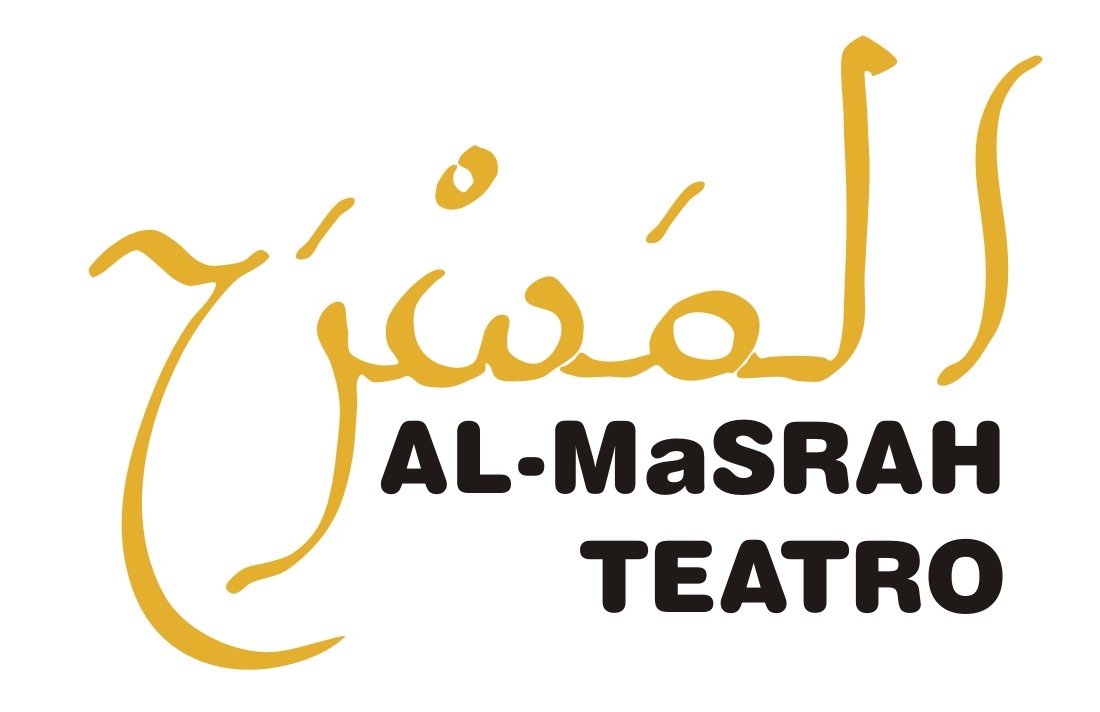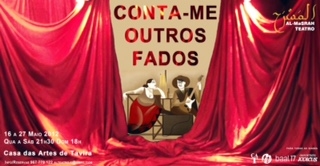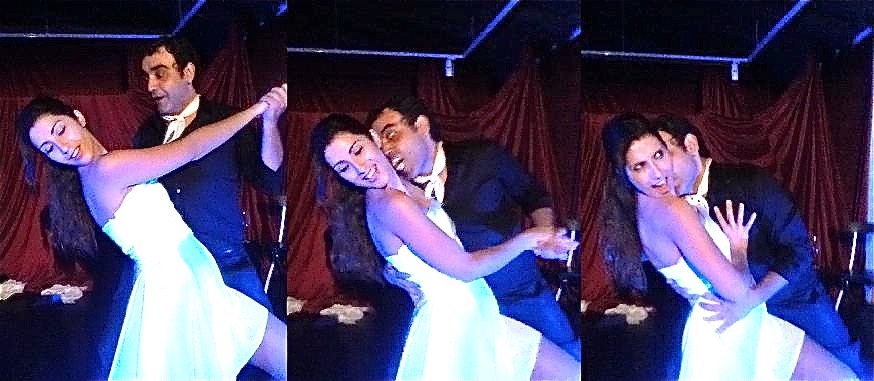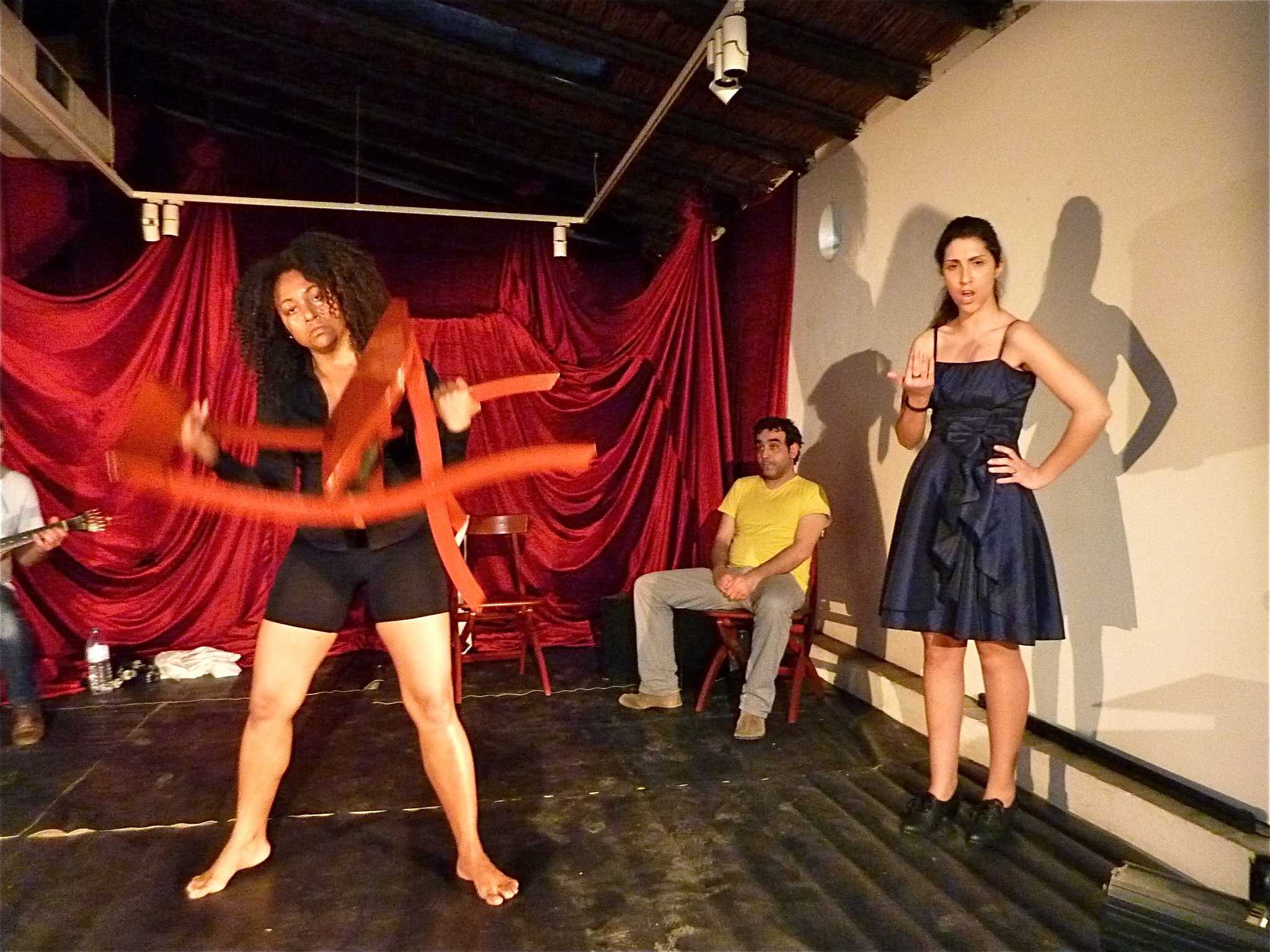Lynne Booker June 2012
In times of economic crisis one of the first public expenditures to be reduced concerns culture. In the current crisis, the Tavira-based AL-MaSRAH Theatre Company recently lost their funding and although the Câmara allows them the use of a base in Tavira, the municipal inspection team will not allow its use for public performances. The group has found at Casa das Artes in Tavira a temporary base through the generosity of José Delgado Martins. Here they were able to create unusual publicity for their next production by opening their rehearsals free of charge to press and public.

The AL-MaSRAH Theatre Company was established in 2004 by a group of professional actors. The Company is led by actor Pedro Ramos and besides putting on performances, company members aim to engage members of the public by workshop participation and by encouraging debate and other forms of interaction. After the cut in their funding, the company decided to target events organisers in the Algarve with their latest production, Conta-me Outros Fados (Tell me about other fados). AL-MaSRAH set out to prove that this show needs so little space and so few props, that it can be presented virtually everywhere.

Conta-me Outros Fados is based on an original idea and script by Tela Leão, the mastermind of the continuing cultural programme Tavira Ilimitada. Tela has been an actress, film producer and film director´s assistant and is therefore familiar with the acting profession and the requirements of the stage. She first worked in the Algarve with the first General Commisioner for Faro Capital of Culture 2005. Through her professional work as a cultural programmer, Tela has a wide range of contacts within Portugal and Europe. She lives in Tavira and is committed to keeping culture alive in the city whose motto is Vive cultura.
Fado is about the unchangeable nature of life and ineluctable fate and many find it a haunting and powerful genre. Performances of fado are especially popular with foreign tourists in Portugal and because Conta-me Outros Fados goes way beyond the music, the Company hopes that tourists will want to see this amazing production. In her story, Tela Leão has included both drama and dance and she tells of the history of fado through its Arabic, African and South American roots and its flamenco, samba, morna and tango rhythms.

In this production by Pedro Nascimento, the fados are sung by the young Catarina Viegas, a relative newcomer to the art of fado singing. Catarina has a magnificent voice in both quality and range and she passes the test of the true fado singer because she is able to communicate emotion and the essence of fado, the saudades, with ease and assurance. In this production she is accompanied on the Portuguese guitar by her father Helder Viegas, who remains on stage for the whole of the performance and her dress was designed by Bruno Guerra and made by Luísa Fernandes..
The third member of the cast is Adriana Castro, a contemporary dancer and actress from Brazil. Behind the scenes light and sound designer/technician Valter Alves brings clever touches to the performance. The performance uses very few props - a chair, a horizontal pole and a rose. The fourth member of the cast is Pedro Ramos himself, who co-wrote the script and co-directed the production. It is Pedro who opens the show by demanding silence as the music is about to begin ...
.... with the Portuguese Meu Fado Meu written and originally sung by one of the best known contemporary fado singers, Mariza. She sings about her life and her fate - that of having to sing fado. From Portugal we move to Brazil with Fado Tropical from the musical Calabar by the Brazilian composer/singer Chico Buarque and his colleague Ruy Guerra. We then have a guitar solo by Helder Viegas which brings us Verdes Anos, the haunting Coimbra fado made famous by one of the masters of the Coimbra guitar, Carlos Paredes.

Music from the Cape Verde Islands was influenced by rhythms from Angola, Algeria, Latin America and is known as morna. Together with morna we have a modinha - a sentimental love song, whose style originated in Portugal in the late eighteenth century, but which is here presented in a form written by the Brazilians Tom Jobim and Vinicius de Moraes. By this point you might have tired of all the saudades and the sadness of fado, and a delightful satirical piece, O Fado Não é Mau (Fado is not bad) is next. By Pedro da Silva Martins from the group Deolinda, this piece uses the clichés of fado in a satrical way. More humour follows with Fado Gago (Stammering fado) by Sérgio Godinho. A stammering singer is invited to write a fado and he finds that he stutters less as he sings and he can recount in song the tragic story of the sailor Chico and his lover Glória.
The piece goes from the ridiculous to the surreal. For the next fado, an extra-terrestrial parks his spaceship in front of a house and after some conversation with the woman of the house, they become friends. As he leaves for his spaceship, she gives him sandwiches, a warm flannel shirt and a glass of wine for the journey. The last piece of music is a tango written by Piazzolla, the father of new tango. It is set in Buenos Aires and in the piece, a madman walks around with half a melon on his head instead of a hat; I remember from my schooldays that the French for a bowler hat is un chapeau melon. Throughout the performance, Adriana Castro portrays the emotions of the fados and illustrates the fado stories through dance, while Pedro narrates the story and history of fado. In Conta-me Outros Fados the story of fado takes the audience around the world and backwards and forwards through time to express the quintessential nature of this particularly Portuguese genre.
This show must go on and on!
